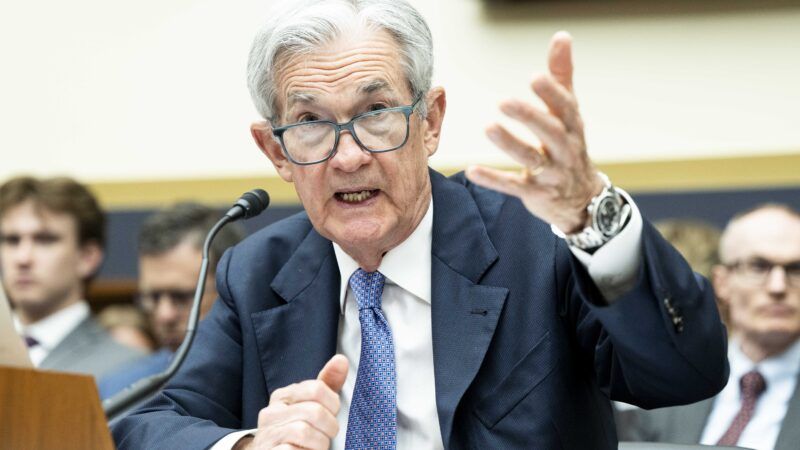Tariffs Are Keeping Interest Rates High
The Federal Reserve is unwilling to lower interest rates because "there will be some inflation from tariffs coming," Jerome Powell told a Senate committee.

Interest rates may have fallen this year, if not for the uncertainty and higher costs created by President Donald Trump's tariff schemes.
Federal Reserve Chairman Jerome Powell told a House committee on Tuesday that the central bank likely would have "continued cutting" interest rates during the first half of 2025, but decided to hold rates higher as a hedge against the higher prices caused by tariffs. The Federal Reserve cut interest rates three times last year, but the central bank has not changed its benchmark interest rate since January and voted last week to hold those rates at the current level of 4.25 percent to 4.5 percent.
"If you just look at the basic data and don't look at the forecast, you would say that we would've continued cutting," Powell told the House Financial Services Committee on Tuesday. "The difference, of course, is at this time all forecasters are expecting pretty soon that some significant inflation will show up from tariffs. And we can't just ignore that."
Powell said that the Federal Reserve is still unsure how much of the higher costs from Trump's tariffs will be passed along to consumers. Until there is more certainty about the federal government's trade policy and the consequences of it, he said the central bank is taking a cautious approach.
On Wednesday, Powell repeated that warning to a Senate committee. "There will be some inflation from tariffs coming," Powell told the Senate Banking Committee. He said that tariffs would raise prices for consumers and reiterated that the Federal Reserve is "just kind of waiting to see more data on that."
Trump has been applying public pressure to Powell and the Federal Reserve to lower interest rates, but Powell's comments this week suggest the president could nudge that process along by reducing or eliminating the tariffs the president has imposed in recent months. Trump has scaled back some of those tariffs and postponed others—but a 10 percent universal tariff remains in effect, as do higher tariffs on imported steel, aluminum, and various other products. America's effective tariff rate is now over 14 percent, up from about 2.3 percent last year.
Businesses are raising prices as a result of the tariffs, and many are expecting more price increases to hit in the months to come, the Federal Reserve reported earlier this month. In the most recent update to its "Beige Book," the Fed reported that "higher tariff rates were putting upward pressure on costs and prices" at businesses across the country.
In some cases, businesses said they were raising prices in anticipation of higher costs coming later this year. One heavy construction equipment supplier told the Federal Reserve that it was raising prices "to enjoy the extra margin before tariffs increased their costs." (Businesses in the Federal Reserve's report are anonymous.)
Some tariff advocates, like American Compass executive director Oren Cass, argue that Powell and the Federal Reserve are overstepping their authority by considering tariffs when determining interest rates. In a post on X, Cass accused Powell of making "a nakedly political decision intended to frustrate the policy choices of elected leaders" by holding interest rates higher due to tariff costs.
Cass' point is that tariffs are not inflationary in the technical sense, because inflation only results from an expansion of the money supply. Tariffs artificially increase prices, but those increases are a function of fiscal policy—that is, higher taxes on imported goods—rather than monetary policy.
Cass is correct about that, though most Americans probably won't find much comfort in knowing that the higher prices created by tariffs are categorized differently by economists than the higher prices created by inflation during the Biden years.
Does that mean Powell is acting in a politically motivated way? Hardly. The Federal Reserve has a mandate to keep inflation down, and higher interest rates are one way to do that—because higher interest rates make it marginally more attractive to save money rather than spend it. Inflation is also holding steady right now: the annual inflation rate was 2.4 percent in May, up from 2.3 percent in April. And Powell is right to point out that many analysts expect rising inflation later this year. The University of Michigan's monthly survey of consumer sentiment shows inflation expectations above 5 percent for the year ahead.
Lowering interest rates now would risk sparking higher inflation. That risk might be more tolerable if Trump weren't already hiking prices in other ways. By holding rates where they are, the Fed is hedging against the possible combination of higher prices from tariffs and higher prices from inflation hitting simultaneously.
Indeed, it's not the Federal Reserve's job to help offset the consequences of Trump's foolish trade policies.
If Trump (and his allies, like Cass) seek greater economic growth and more affordable prices, then the president should simply undo his tariffs. That would prevent a huge tax increase, provide more certainty to American businesses, and protect consumers from higher prices. It might also encourage the Federal Reserve to cut interest rates, which would provide additional relief in the form of lower mortgage rates and more affordable loans of all kinds.


Show Comments (83)